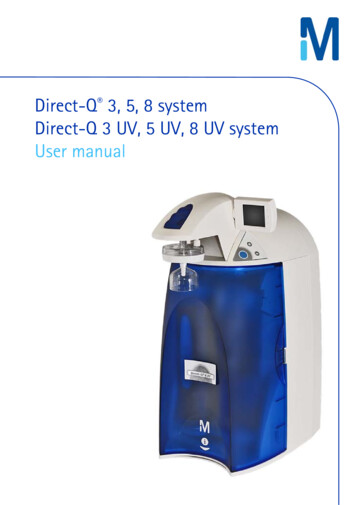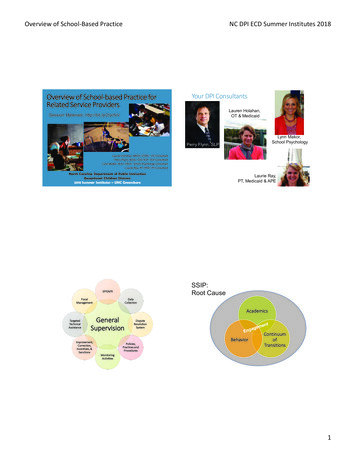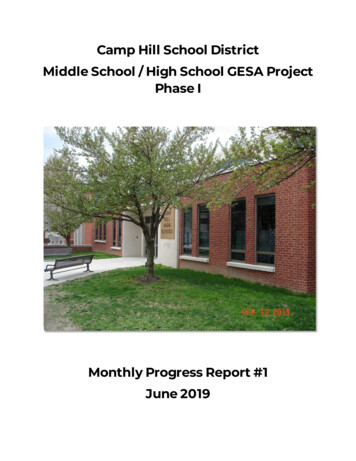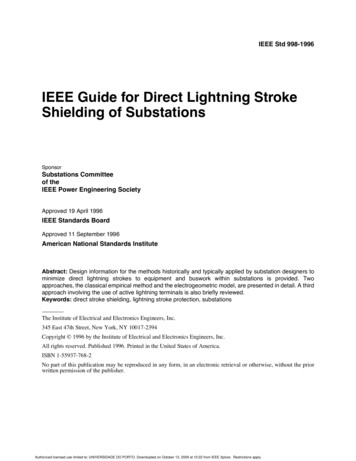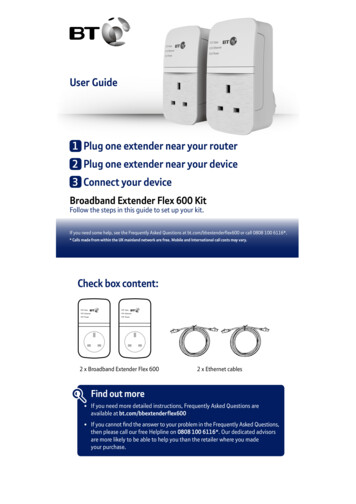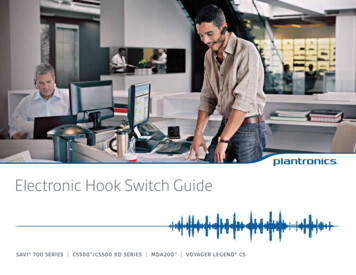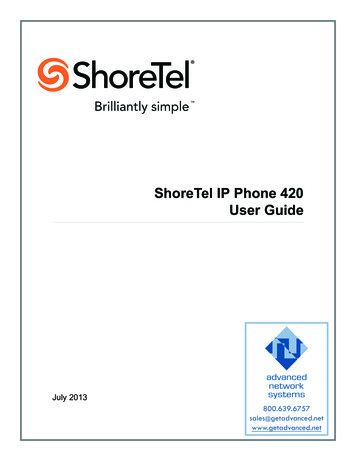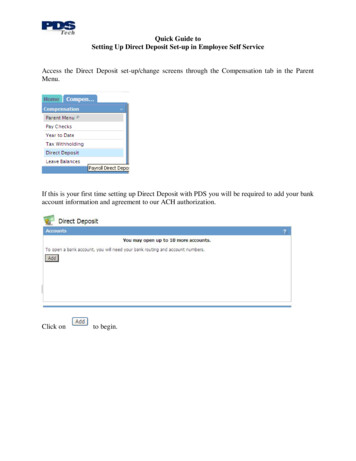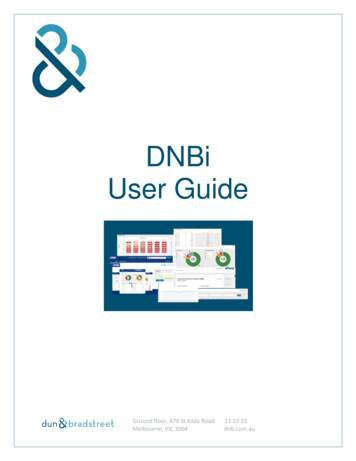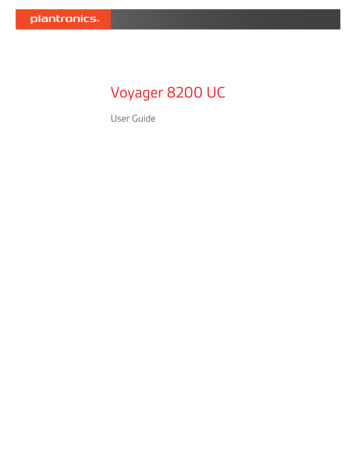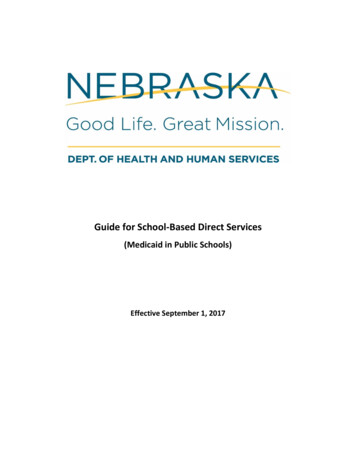
Transcription
Guide for School-Based Direct Services(Medicaid in Public Schools)Effective September 1, 2017
ContentsNEBRASKA DEPARTMENT OF HEALTH AND HUMAN SERVICES . 3DIVISION OF MEDICAID AND LONG-TERM CARE . 3GUIDANCE DOCUMENT . 3Definitions . 4Key Items that you need to remember when accessing School-Based Services . 5Service Definitions . 6Direct Services. 9Attachment One. 14MIPS Documentation . 14Attachment Two . 15Direct Service Referral Form . 15
NEBRASKA DEPARTMENT OF HEALTH AND HUMAN SERVICESDIVISION OF MEDICAID AND LONG-TERM CAREGUIDANCE DOCUMENT“This guidance document is advisory in nature but is binding on an agency untilamended by such agency. A guidance document does not include internalprocedural documents that only affect the internal operations of the agency anddoes not impose additional requirements or penalties on regulated parties orinclude confidential information or rules and regulations made in accordance withthe Administrative Procedure Act. If you believe that this guidance documentimposes additional requirements or penalties on regulated parties, you mayrequest a review of the document.”Pursuant toNeb. Rev. Stat. 84-901.03
DefinitionsACTIVITIES OF DAILY LIVING. Self-care activities which must be accomplished byan individual for continued well-being including mobility and transferring,dressing and grooming, bathing and personal hygiene, toileting, bladder care,and eating.DRIVER. An individual, employed by the provider and has a valid driver’s licenseto operate the specially adapted vehicle.NON-EMERGENCY MEDICAL SERVICE. Transportation for children both to andfrom medically necessary therapy appointments as defined in an IndividualEducation Plan (IEP) or Individualized Family Service Plan (IFSP).OUTSIDE MEDICAL SERVICE. A medical service received in a facility not locatedon the premises of the educational facility the student attends.PAY-TO PROVIDER. The provider identified in the “Pay-To” field on the MC-19,Nebraska Medical Assistance Service Provider Agreement.PROVIDER. For the purposes of this 471 Nebraska Administrative Code (NAC)Chapter 25 only, the “provider” is a Public School District, Education ServicesUnit (ESU) or Approved Cooperatives.REGULAR OR GENERAL EDUCATION SCHOOL BUS. A school bus or vehicle,provided by the school district, used to pick up and deliver general educationstudents from school pick up site to school.SERVICE RENDERING PROVIDER. The provider who provides services directly tothe client.SPECIALLY ADAPTED VEHICLE. A vehicle equipped with adaptive devices tomedically accommodate physical disabilities of passengers. Examples ofadaptive devices include, but are not limited to, wheelchair locks, wheelchair liftor ramp, or oxygen hookups.TRANSPORTATION AIDE. An individual, employed by the provider, who canassist with passenger needs and transportation accommodations, as stated inthe student Individual Education Plan (IEP) or Individualized Family Service Plan(IFSP).
Key Items that you need to remember when accessing School-BasedServices You need to enroll ALL direct service providers with Nebraska Medicaid.This can be accomplished by contact Maximus.Maximus .com Providers that have a license through the Nebraska Department of PublicHealth need to get a NPI number. This can be attained by going to thefollowing website: https://nppes.cms.hhs.gov. Documentation is required for ALL direct services that are providedaccording to IDEA and Medicaid Standards (See Attachment One). Alldocumentation must be kept on file for no less than six years. Physician referral needs to be obtained for all direct services. Whenobtaining a physician referral it ensures that the service(s) being providedare appropriate. The referral can be provided by an enrolled Medicaidprovider that is a licensed physician, physician’s assistant, or a licensed andcertified nurse practitioner. You usually only need to obtain a physicianreferral one time. However in the following circumstances another referralmay need to be obtained: referring physician’s death, retirement or loss oflicense or if additional direct services are being added. (PractitionerReferral Form, see attachment Two) Claims need to be submitted for children that are eligible for Medicaid inPublic Services (MIPS). These claims are submitted through the NebraskaDepartment of Education Portal. Who is eligible for MIPS? Children that arebirth to twenty-one years of age, currently enrolled in Nebraska Medicaidand have the services written in their IEP (Individual Education Plan) or IFSP(Individual Family Service Plan). Regulations that govern the School-Based Services Program 471 NACChapter 25.
Service Definitions**These will help you determine who can provide direct services. **Medical Transportation Services Provider personnel (bus driver, aides, etc.) must be employed by or undercontract with the school district, ESU, or approved cooperatives providingspecial education and related services. Nebraska school districts, ESUs, andapproved cooperatives providing special education and related servicesmust be enrolled in Nebraska Medicaid as the qualified providers ofservices.Mental Health and Substance Use Disorder Services Physician,Licensed Psychologist,Licensed Independent Mental Health Practitioner (LIMHP),Licensed Mental Health Practitioner (LMHP),Licensed Alcohol and Drug Counselor (LADC) for substance use servicesonly,Provisionally Licensed LADC for substance use only,Provisionally Licensed Psychologist,Provisionally Licensed Mental Health Practitioner (PLMHP),Board Certified Behavioral Analyst,Board Certified Assistant Behavioral Analyst,Registered Behavior Technician.*Provider personnel must be employed by or under contract with the schooldistrict, ESU, or approved cooperatives providing special education and relatedservices.
Nursing Services Licensed RN,Licensed LPN,Health technicianHealth paraprofessional under the supervision of a licensed RN or licensedLPN.*Provider personnel must be employed by or under contract with the schooldistrict, ESU, or approved cooperatives providing special education and relatedservices.Occupational Therapy Services Licensed occupational therapist, Licensed occupational therapy assistant or paraprofessional under thesupervision of licensed occupational therapist.*Provider personnel must be employed by or under contract with the schooldistrict, ESU, or approved cooperatives providing special education and relatedservices.Personal Assistance Services Personal assistance providers must be age 19 or older.*Provider personnel must be employed by or under contract with the schooldistrict, ESU, or approved cooperatives providing special education and relatedservices.**Definition of Services that can be provided:Personal assistance services are tasks to assist with Activities of Daily Living(ADLs), intended to supplement the child’s own personal abilities andresources and documented in the IEP or IFSP.i. Basic personal hygiene;ii. Toileting/bowel and bladder care;
iii. Mobility and transfers;iv. Assistance with self-administered medications; andv. Assistance with food, nutrition, and diet activitiesPhysical Therapy Services Licensed physical therapist, Licensed physical therapy assistant or paraprofessional under thesupervision of licensed physical therapist.*Provider personnel must be employed by or under contract with the schooldistrict, ESU, or approved cooperatives providing special education and relatedservices.Services for Individuals with Speech, Hearing, and Language Disorders Licensed speech pathologist,Licensed audiologist,Paraprofessional under the supervision of a licensed speech pathologist,Medicaid enrolled speech therapist.*Provider personnel must be employed by or under contract with the schooldistrict, ESU, or approved cooperatives providing special education and relatedservices.Visual Care Services Licensed optometrist Licensed ophthalmologist*Provider personnel must be employed by or under contract with the schooldistrict, ESU, or approved cooperatives providing special education and relatedservices.
Direct ServicesServices must be provided in accordance with all regulations and statutesgoverning the provision of Special Education School-Based Services to residentchildren of the State of Nebraska, and the following criteria (see 471 NAC 25003.02A – 25-003.01) must be met.All Special Education School-Based Services covered under this chapter must benecessary to meet the unique needs of the student and family and recommendedas:(i) A related service or supplementary aid or service in an IndividualEducation Program(IEP); or(ii) An early intervention service in an Individualized Family Service Plan(IFSP).PHYSICAL THERAPY, OCCUPATIONAL THERAPY, SPEECH PATHOLOGY ANDAUDIOLOGY SERVICES. Medicaid covers physical therapy, occupational therapy,and speech pathology and audiology services as indicated in the child’s IndividualEducation Plan (IEP) or Individualized Family Service Plan (IFSP), and provided inaccordance with the provider standards outlined in this chapter. Additionally,each therapy must be referred or prescribed by a physician, physician's assistant,or certified nurse practitioner. If services are referred or prescribed by aphysician’s assistant, corresponding claims must include the license number ofthe supervising physician to whom the referring or prescribing physician’sassistant is assisting.MENTAL HEALTH SERVICES. Medicaid covers behavioral modification,psychotherapy services, psychological testing, assessment needs for specifictherapy services and evaluation as documented in an Individual Education Plan(IEP) or Individualized Family Service Plan (IFSP). In addition to the requirementsin 25-003.01 (D), mental health services must:
(i)Be necessary to diagnose, treat, cure or prevent regression of significantfunctional impairments resulting from symptoms of a mental health disorderdiagnosis;(ii)Be supported by evidence that the treatment improves symptoms andfunctioningfor the individual client’s mental health or substance use disorderdiagnosis; and(iii) Be reasonably expected to improve the individual’s condition or preventfurther regression so that the services will no longer be necessary.NURSING SERVICES. Medicaid covers medically necessary nursing services whenthey are documented in an Individual Education Plan (IEP) or Individualized FamilyService Plan (IFSP) and ordered by the client’s physician. Nursing services must beprovided through direct intervention within the scope of professional practice ofthe Registered Nurse (RN) or Licensed Practical Nurse (LPN); during a face-to-faceencounter. Nursing services cover Registered Nurse (RN) or Licensed PracticalNurse Licensed Practical Nurse (LPN) services when ordered by the client’sphysician based on medical necessity. Covered nursing services include thefollowing:(i)Vitamin B-12 Injections: Covered only for treatment of perniciousanemia;(ii)Decubitus and Skin Disorders: The physician order must indicateskilled care, requiring prescribed medications and treatment. UsuallyStage III (deep without necrotic tissue). Infected decubiti areincluded when treatment specifically ordered by physician;(iii)Colostomy, Ileostomy, and Gastrostomy: Covered for immediatepostoperative time when maintenance care and control by thepatient or family is being established;(iv)Bowel and Bladder Training: Covered to teach skills and factualinformation necessary to adhere to a specific formal regime;
(v)Urethral Catheters and Sterile Irrigations: Covered for insertions andchanges when active urological problems are present and the client isunable to do physician-ordered irrigations;(vi)Observation and Evaluation: Must require furnishing of a skilledservice for an unstable condition. The client must have:(1) Had a recent acute episode (past 30-60 days);(2) A well-documented history of noncompliance withoutnursing intervention; or(3) A Significant high probability that complications would arise(within 30 to 60 days) without the skilled supervision of thetreatment program on an intermittent basis.(vii) Teaching and Training Activities:(1) Skills requiring the knowledge of nurse(a)Injections;(b)Irrigating a catheter;(c)Care of ostomy;(d)Respiratory treatment;(e)Preparation and following a therapeutic diet;(f)Application of dressing to wounds involving prescriptionmedications or aseptic techniques;(g)Bladder training; and(h)Bowel training (only when incontinency exists).(1)Use of adaptive devices and special techniqueswhen loss of function has occurred; and(2)Performance of body transfer activities.(viii) Enemas and Removal of Impactions: Covered when the skills of anurse are required;
(ix) Dressings: Covered when aseptic technique and prescriptionmedications are used;(x) Casts: Covered if the necessary level of care is other than routine care;(xi) Diabetic (blind or disabled): Covered to prefill insulin syringes, bloodsugar testing and foot care;(xii) Teaching and Training during Postpartum: Teaching and training mustrequire the skills and knowledge of a nurse. Visits are limited to twomaximum, unless an unusual situation is well documented; or(xiii) Enterostomal Therapy.PERSONAL ASSISTANCE SERVICES. Personal assistance services are tasks to assistwith Activities of Daily Living (and other activities listed in 471 NAC Chapter 15)and intended to supplement the child’s own personal abilities and resources.These services are provided to persons with disabilities and chronic conditions toenable them to accomplish tasks that they would normally do for themselves ifthey did not have a disability. The services must be determined and documented,based on individual needs and criteria, in a written Individual Education Plan (IEP)or Individualized Family Service Plan (IFSP) which has been approved by aconsulting physician. Services authorized in the Individual Education Plan (IEP) orIndividualized Family Service Plan (IFSP) must relate directly to the needsidentified accompanying in the assessment. These services include:(i) Basic personal hygiene: Providing or assisting in bathing, shampoo, hairgrooming; nail care; oral hygiene; shaving; and dressing;(ii) Toileting, bowel and bladder care: Assisting to and from bathroom, onand off toilet or commode, diapering, bedpan; external cleansing ofperineal area; maintenance bowel care; and changing or emptying catheterbag;(iii) Mobility, transfers: Assisting with ambulation with or without aids;repositioning; encouraging active range-of-motion exercises; assisting withpassive range-of-motion exercise; and assisting with transfers with orwithout mechanical devices;
(iv) Nutrition: Assisting with food, nutrition, and diet activities; and(v) Medications: Assisting with administration of medications; remindingappropriate persons when prescriptions need to be refilled or taken.SPECIAL TRANSPORTATION SERVICES. Transportation services to and from nonemergency outside medical services provided by school personnel and use ofspecially adapted school vehicle to meet student needs. Transportation aide anddriver must both be included on transport. The student must be in attendance atschool on day of medical service to receive transportation services, and cannot betaken directly from home to the medical service. Medical services must beprovided on same day as the transportation to be covered. Only one round triptransportation per vehicle is covered each day, and the transportation cannotduplicate what would otherwise have been received in the course of attendingschool. The need for the medical service and transportation must be documentedin the student Individual Education Plan (IEP) or Individualized Family Service Plan(IFSP).VISUAL CARE SERVICES. Medically necessary assessment to diagnose or treat aspecific eye disorder, disease, symptom, complaint, or injury and vision therapy.One assessment per calendar year for Medicaid eligible students is allowed. Theassessment must be performed in the school by a licensed ophthalmologist oroptometrist.
Attachment OneMIPS DocumentationName of Child:Date of Birth:Diagnosis:Date of service:Duration of Service (Time in and Time out):IEP/IFSP Treatment Goal:Progress:Signature and Credentials of the servicing provider:Requirements for direct service documentation Records must be kept for at least 6 years.Documentation must include name, demographic information, diagnosis or need for the service.Please use the diagnosis code.Documents for each date of service are required.Evaluations.Ensure that treatment goals and a Plan of Care must be part of the documentation.Recertification’s that the care is appropriate for the client’s needs and should continue.Progress notes for each date of service.Documentation from ordering physician, physician’s assistant, or certified nurse practitionerIEP, IFSP or MDT PlansThe order, prescription, or treatment plan of an ordering professional. The signed IEP/IFSP isacceptable.The signature, credential, and signature date of the providerDocumentation must be legibleDocumentation should be available in the client’s file at the time a claim is submitted forreimbursement.
Attachment TwoDirect Service Referral FormPractitioner Referral FormTo: Physician, Physician Assistant, or Nurse Practitioner:In order for school districts to receive reimbursement from Nebraska Medicaid forSchool-Based Services a physician, physician assistant or nurse practitionerreferral is required. Please complete this form and return it to the school districtlisted below.Student’s Name (Last, First, MI)I am referring the student for services below based on review of evaluation (s) forservice (s).(Direct services available are: Occupational Therapy, Physical Therapy, Speech Therapy, Nursing,Personal Assistance Services, Mental Health, Vision and Transportation.)Practitioner’s Signature:Practitioner’s Printed Name AND Credentials:NPI (National Provider Identification):Date:Comments:Please return this form and documentation to:School District/Address
Department of Education Portal. Who is eligible for MIPS? Children that are birth to twenty-one years of age, currently enrolled in Nebraska Medicaid and have the services written in their IEP (Individual Education Plan) or IFSP (Individual Family Service Plan). Regulations that govern the School-Ba
